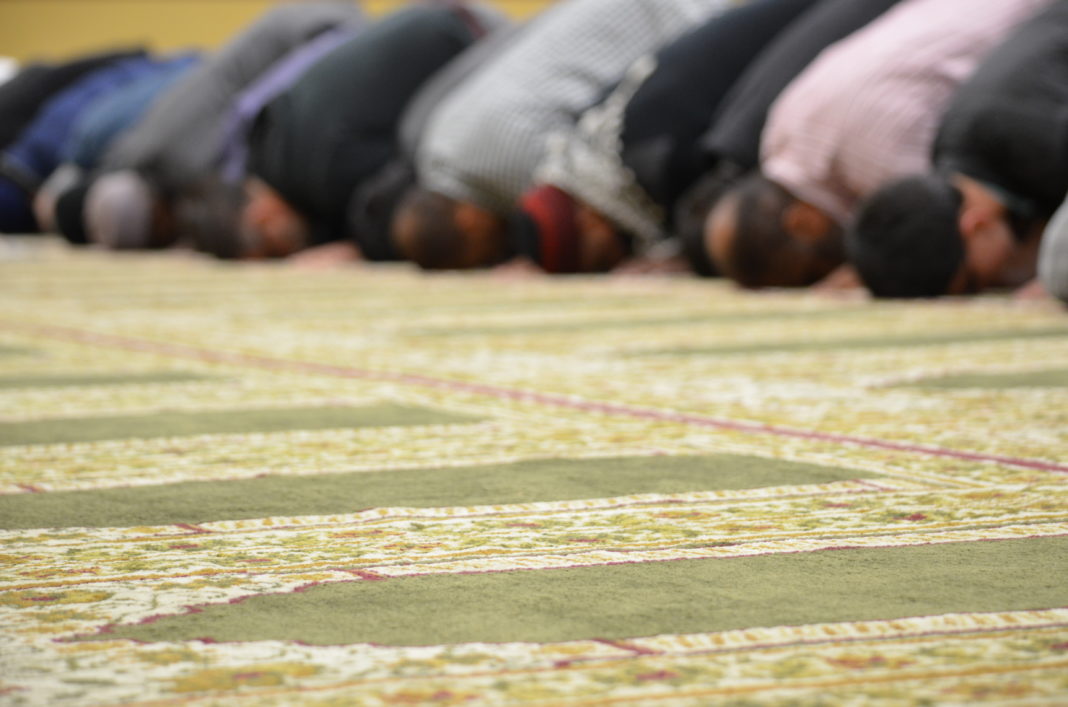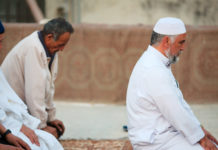All praise belongs to the Lord of the Heavens and the Earth, who has chosen Islam as our religion. Islam addresses the needs of all people—all the physical and spiritual, individual and social, inner and outer aspects of our faith.
Faith is not about proclaiming the basic tenets of Islam by words alone. It requires heartfelt belief, powerful enough to manifest in righteous actions. The Qurʾan in many verses clarifies this strong relationship, and mentions faith and righteous deeds together:
وَعَدَ اللَّـهُ الَّذِينَ آمَنُوا وَعَمِلُوا الصَّالِحَاتِ لَهُم مَّغْفِرَةٌ وَأَجْرٌ عَظِيمٌ
Allah has promised those who have faith and do righteous deeds forgiveness and a great reward. [1]
وَالَّذِينَ آمَنُوا وَعَمِلُوا الصَّالِحَاتِ وَآمَنُوا بِمَا نُزِّلَ عَلَىٰ مُحَمَّدٍ وَهُوَ الْحَقُّ مِن رَّبِّهِمْ كَفَّرَ عَنْهُمْ سَيِّئَاتِهِمْ وَأَصْلَحَ بَالَهُمْ
But those who have faith and do righteous deeds and believe in what has been sent down to Muhammad—and it is the truth from their Lord—He shall absolve them of their misdeeds and set right their affairs. [2]
وَالْعَصْرِ. إِنَّ الْإِنسَانَ لَفِي خُسْرٍ. إِلَّا الَّذِينَ آمَنُوا وَعَمِلُوا الصَّالِحَاتِ وَتَوَاصَوْا بِالْحَقِّ وَتَوَاصَوْا بِالصَّبْرِ
By Time! Man is indeed in loss, except those who have faith and do righteous deeds, and enjoin one another to [follow] the truth, and enjoin one another to patience. [3]
Prayers—Before Prophet Muhammad’s (ṣ) Time
Performing the daily prayers is the most important obligation for all Muslims, whether rich or poor, men or women, healthy or ill. Previous religious communities were also required to pray, though the manner of praying may have differed. This is made clear in the Qurʾan:
Prophet Ibrāhīm prays to his Lord:
رَبِّ اجْعَلْنِي مُقِيمَ الصَّلَاةِ وَمِن ذُرِّيَّتِي رَبَّنَا وَتَقَبَّلْ دُعَاءِ
My Lord! Make me a maintainer of prayer, and among my descendants [as well]. Our Lord, accept my supplication. [4]
وَاذْكُرْ فِي الْكِتَابِ إِسْمَاعِيلَ إِنَّهُ كَانَ صَادِقَ الْوَعْدِ وَكَانَ رَسُولًا نَّبِيًّا. وَكَانَ يَأْمُرُ أَهْلَهُ بِالصَّلَاةِ وَالزَّكَاةِ وَكَانَ عِندَ رَبِّهِ مَرْضِيًّا
And mention in the Book, Ismāʿīl (Ishmael—ʿa). Indeed, he was true to his promise, and an apostle and prophet. He used to bid his family to [maintain] the prayer and to [pay] the zakat, and was pleasing to his Lord. [5]
In Allah’s conversation with Mūsā (Moses—ʿa):
إِنَّنِي أَنَا اللَّـهُ لَا إِلَـٰهَ إِلَّا أَنَا فَاعْبُدْنِي وَأَقِمِ الصَّلَاةَ لِذِكْرِي
Indeed I am Allah—there is no god except Me. So worship Me, and maintain the prayer for My remembrance. [6]
When Prophet ʿĪsā (Jesus—ʿa) spoke to the people:
قَالَ إِنِّي عَبْدُ اللَّـهِ آتَانِيَ الْكِتَابَ وَجَعَلَنِي نَبِيًّا. وَجَعَلَنِي مُبَارَكًا أَيْنَ مَا كُنتُ وَأَوْصَانِي بِالصَّلَاةِ وَالزَّكَاةِ مَا دُمْتُ حَيًّا
He said, “Indeed I am a servant of Allah! He has given me the Book and made me a prophet. He has made me blessed, wherever I may be, and He has enjoined me to [maintain] the prayer and to [pay] the zakat as long as I live.” [7]
The Importance of Prayer
The Qurʾan emphasizes prayer’s importance in many verses, repeating the word ṣalāh (prayer) 79 times. Many aḥādīth also emphasize its significance; we will suffice here with two:
The Prophet (ṣ) said:
أَوَّلُ مَا افْتَرَضَ اللٌّهُ عَلى أُمَّتِي الصَّلَوَاتُ الْخَمْسُ وَ أَوَّلُ مَا يُرفَعُ مِنْ أَعْمَالِهِمْ الصَّلَوَاتُ الْخَمْسُ وَ أَوَّلُ مَا يُسْأَلُونَ عَـنْهُ الصَّلَوَاتُ الْخَمْسُ
The five prayers are the first mandate of God upon my ummah; the five prayers will ascend first from their acts of worship; and the five prayers will be the first thing they will be asked about. [8]
Imam Muḥammad al-Bāqir (ʿa) said:
أَلصَّلاَةُ عَمُودُ الدِّينِ مَثَلُهَا كَمَثَلِ عَمُودِ الْفُسْطَاطِ إِذَا ثَبَتَ الْعَمُودُ ثَبَتَ الأَوْتَادُ وَ الأَطْنَابُ وَ إِذَا مَالَ الْعَمُودُ وَ انْكَسَرَ لَمْ يَثْبُتْ وَتِدٌ وَ لاَ طُنُبٌ
The prayer is the pillar of religion and its parable is that of the tent’s poles—when the pole remains sturdy, the pegs and ropes are also sturdy, but when the poles bend and break neither peg nor rope holds. [9]
Congregational Prayers—In Qurʾan and Aḥādīth
It is highly recommended to pray the daily obligatory prayers in congregation. Praying in congregation is mentioned in the Qurʾan and its benefits are highlighted in numerous aḥādīth:
Shaykh Abū ʿAlī al-Faḍl al-Ṭabarsī mentions in his Qurʾanic exegesis, Majmaʿ al-Bayān, that the latter part of the following verse is referring to performing the prayers in congregation.
وَأَقِيمُوا الصَّلَاةَ وَآتُوا الزَّكَاةَ وَارْكَعُوا مَعَ الرَّاكِعِينَ
And maintain the prayer, and give the zakat, and bow along with those who bow [in prayer]. [10]
Imam Jaʿfar al-Ṣādiq (ʿa) said:
مَنْ صَلّى الغداةَ و العِشاءَ الآخرةَ في جماعةٍ فَهُوَ فِي ذِمَّةِ اللهِ عزّ وجلَّ وَ مَنْ ظَلَمَهُ فَأَنَّما يَظْلِمُ اللهَ وَمَنْ حَقَّرَهُ فانّما يُحَقِّرُ اللهَ عزّ وجلّ
The one who prays the morning prayer [fajr] and last prayer of the evening [ʿishāʾ] in congregation is in the protection of Allah; whoever wrongs him has wronged none other than God Himself—the Lofty and Sublime—and whoever belittles him has belittled none other than God Himself—the Lofty and Sublime.[11]
Imam Muḥammad al-Bāqir (ʿa) said:
لا صلاةَ لِمَنْ لا يَشْهَدُ الصلاةَ مِنْ جِيرَانِ المسجدِ إِلَّا مريض أَوْ مَشغول
Invalid are the prayers of he who neighbors the mosque and yet does not pray there, unless he is sick or occupied. [12]
All the jurists of both our time and the past have emphasized that praying in congregation is highly recommended, especially with respect to fajr and ʿishāʾ prayers.
Congregational Prayers—In the Prophet’s Time
Prayer was legislated before the migration to Medina, and the Prophet used to pray in congregation whenever it was possible. It is also reported that Imam ʿAlī and Lady Khadījah used to pray behind the prophet in Masjid al-Ḥarām.
When the Prophet and his companions migrated to Medina, they were able to practice their religion freely, and this enabled the Prophet and his companions to build mosques in and around the city. One would expect that there would be only one mosque in Medina where all Muslims could gather to offer prayers behind the Prophet, but in fact there were quite a few. Among the well-known are:
- al-Masjid al-Nabawī, built by the Prophet in the heart of the city.
- Masjid Qubāʾ, the first mosque built on the outskirts of Medina during the Prophet’s migration.
- Masjid al-Qiblatayn, in which the qiblah changed from Bayt al-Maqdis in Jerusalem towards the Kaʿbah in Mecca while the Prophet was praying.
The Qurʾan also mentions a mosque which was built with ulterior motives, a mosque the Prophet was ordered not to pray in:
وَالَّذِينَ اتَّخَذُوا مَسْجِدًا ضِرَارًا وَكُفْرًا وَتَفْرِيقًا بَيْنَ الْمُؤْمِنِينَ وَإِرْصَادًا لِّمَنْ حَارَبَ اللَّـهَ وَرَسُولَهُ مِن قَبْلُ وَلَيَحْلِفُنَّ إِنْ أَرَدْنَا إِلَّا الْحُسْنَىٰ وَاللَّـهُ يَشْهَدُ إِنَّهُمْ لَكَاذِبُونَ. لَا تَقُمْ فِيهِ أَبَدًا لَّمَسْجِدٌ أُسِّسَ عَلَى التَّقْوَىٰ مِنْ أَوَّلِ يَوْمٍ أَحَقُّ أَن تَقُومَ فِيهِ فِيهِ رِجَالٌ يُحِبُّونَ أَن يَتَطَهَّرُوا وَاللَّـهُ يُحِبُّ الْمُطَّهِّرِينَ
As for those who took to a mosque for sabotage and for defiance, and to cause division among the faithful, and for the purpose of ambush [used] by those who have fought Allah and His Apostle before—they will surely swear, “We desired nothing but good,” and Allah bears witness that they are indeed liars. Do not stand in it ever! A mosque founded on piety from the [very] first day is worthier that you stand in it [for prayer]. Therein are men who love to keep pure, and Allah loves those who keep pure. [13]
The presence of multiple mosques in the city of Medina suggests that performing the prayers in congregation was an important part of the daily routines of the Muslims of Medina.
Congregational Prayers—Socio-Political Benefits
Along with spiritual rewards and benefits, there are many socio-political benefits of congregational prayer. Allah and his beloved Prophet (ṣ) have set a high goal for the Muslim society, which is mentioned in both the Qurʾan and the aḥādīth:
إِنَّمَا الْمُؤْمِنُونَ إِخْوَةٌ
The faithful are indeed brothers…[14]
Imam al-Ṣādiq (ʿa) is reported to have said:
المؤمنون في تبارهم وتراحمهم وتعاطفهم كمثل الجسد، إذا اشتكى تداعى له سائره بالسهر والحمى
“Believers are like a single body in their mutual goodness, compassion, and affection; when it suffers [from pain], the rest of the body (also) reacts with a fever and sleeplessness.”[15]
We care for our biological brothers and sisters and respond to them in their times of need. Allah and His Prophet expect us to care for the rest of the believers in the same way. Congregational prayers can help in achieving this goal, as we get a chance to meet and interact with other believers, and share our joys and concerns with each other.
We should make every effort to gather at the nearest mosque or Islamic center to offer daily prayers in congregation. Praying at a mosque has higher rewards, but if one cannot do that due to distance or because of other reasons, congregational prayers can be done at home with one’s family members to reap the benefits of the congregational prayer. All that is required to establish congregational prayer is that the prayer leader be a Shiʿi who is sane, upright in character, of legitimate birth, and able to correctly articulate at least Surat al-Ḥamd and the second surah. If there is a male in the congregation then the prayer leader must be male; but if the congregation is made entirely of women, then a woman can lead the prayer. The congregation must have at least one follower of discerning age or older.
We make efforts to gather our family at the dinner table; similar efforts to gather family for congregational prayer can help remind everyone in the family about the purpose of life and help in developing the family’s spirituality. The Prophet, Lady Khadījah, and Imam ʿAlī praying together in the early days of Islam is a good example for us to follow.
If one has an option to offer prayers alone or in congregation, at home or at a mosque, then praying at the mosque has much higher reward. The following excerpt from the book al-Rawḍah al-Bahiyyah fī-Sharḥ al-Lumʿah al-Dimashqiyyah, one of the most celebrated and well-known textbooks of Islamic law in the Shiʿi world, illustrates this point:
“It is recommended to offer obligatory prayers in congregation; performing the daily prayers in congregation has been especially emphasized. The reward of one prayer done in congregation is equivalent to 5, 7, or 20 prayers when the prayer leader is not a religious scholar; behind a religious scholar, it is equivalent to one thousand prayers. If done in a mosque, reward increases considerably: praying behind a non-religious scholar is equivalent to twenty seven hundred prayers and praying behind a religious scholar is equivalent to one hundred thousand prayers. This reward multiplies with each person joining in congregation up to the tenth; if participation in congregation goes beyond that, nobody can count the reward except for Allah.”
I pray to Allah, that He guides us all to His path, and gives us the opportunity to perform this highly virtuous deed of congregational prayers on a daily basis.
[1] Al-Māʾidah: 9. Translations of Qurʾanic verses are from ʿAlī Qulī Qarāʾī’s Qurʾanic translation; translations of aḥādīth are by the author.
[2] Muḥammad: 2.
[3] Al-ʿAṣr: 1-2.
[4] Ibrahīm: 40.
[5] Maryam: 40.
[6] Ṭāhā: 14
[7] Maryam: 30-1
[8] Al-Hindī, ʿAllāmah ʿAlī al-Muttaqī ibn Jāsim al-Dīn, Kanz al-ʿUmmāl, vol. 7, 18859, (Beirut: Muʾassasah al-Risālah, 1985), 276.
[9] Muḥammad ibn al-Ḥasan al-Ḥurr al-ʿĀmilī, Wasāʾil al-Shīʿah, vol. 4, 4464 (Beirut: Muʾassasah Āl al-Bayt—ʿalayhim al-salām—li-Ihyāʾ al-Turāth, 1993), 27.
[10] Al-Baqarah: 43
[11] Muḥammad ibn ʿAlī al-Bābawayh al-Ṣadūq, “al-Jamāʿah wa-Faḍlih” in Man lā-Yaḥḍuruh al-Faqīh, vol. 1, 1099 (Beirut: Dār al-Turāth li-l-Matbūʿāt, 1994), 308.
[12] al-Ḥurr al-ʿĀmilī, Wasāʾil al-Shīʿah, vol. 8, 10696, 291.
[13] Al-Tawbah: 107-8
[14] Al-Ḥujurāt: 10
[15] al-Ḥurr al-ʿĀmilī, Wasāʾil al-Shīʿah, vol. 12, 14507, 424.




